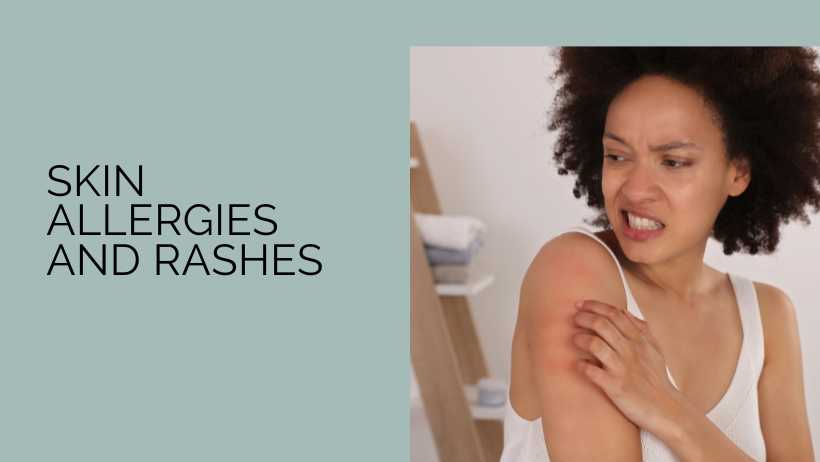
Skin allergies and skin rashes can be very painful if the correct cause is not determined and proper medication is not taken to treat it. Several triggers can aggravate rashes and allergies, and if one is not aware of what one is allergic to, the problem can get out of control.
Rashes and skin allergies should not be ignored, and immediate attention should be given to the problem by seeking the guidance of an expert dermatologist.
One of the most common skin rashes is eczema. It is a term that is used for a group of skin conditions. Itching, dryness, inflammation, and thick skin come under the bracket of eczema.
Causes of Skin Allergies and Rashes
The cause of these conditions is still unknown. It is difficult to ascertain why not everyone exposed to the same situation is affected. People who suffer from nonskin allergies (asthma and hay fever) are more prone to getting atopic dermatitis. Atopic dermatitis is a problem in kids.
Contact dermatitis differs from atopic dermatitis and is common among people with skin allergies. Contact dermatitis can occur at any age. Hand dermatitis happens by exposure to skin irritants like chemicals or detergents. Dry skin is also a common problem, and one can develop chapped skin if the proportion oil is not balanced on the surface of your skin.
Itching and scratching are characteristic of eczema, which only aggravates the problem. You may feel itchy at first and want to scratch more, but constant scratching can irritate the skin to a great extent.
Do’s and Don’ts
There are several ways in which you can prevent the problem from getting worse. Primary treatment and dos and don’ts can help you be comfortable and avoid dry, itchy skin.
Do’s
- Keep your skin hydrated at all times. Use a good moisturizer at least twice a day
- Try and analyze what aggravates the problem. Identifying the triggers can help you in getting rid of the problem fast
- Use a humidifier to hydrate the dry air in your bedroom
- You may not realize, but you may scratch yourself when you feel itchy in your sleep. Keep your fingernails short and wear cotton gloves to avoid aggravating the condition
- Ideally, you should use non-alkaline soaps or soapless cleansers
- Try and keep your hands dry most of the time. Wear gloves when you are washing clothes or vessels
Don’t
- Do not give in to the itching. Try and resist the itch. Scratching will only aggravate the problem
- Do not use regular soap; use soapless cleansers on non-alkaline cleansers
- Added fragrances can create a problem, and therefore, you should not use soaps that come with added fragrances
- Do not let blankets and wool clothing be in direct contact with your skin
- Do not expose yourself to extreme temperatures
Skin rashes and allergies can be painful, but a little willpower can help you get rid of the problem quickly. Ideally, you should consult a good dermatologist if the itching is causing problems for you and you cannot control the scratching.
Home Remedies for Skin Allergies
To treat skin allergies, you may consider these home remedies: paste of sandalwood, turmeric and lime juice, crushed almond leaves, neem and turmeric paste, crushed cassia leaves, neem leaves, or holy basil.
Paste of Sandalwood, Turmeric and Lime Juice
Experts suggest that lime juice can kill any surface bacteria on your skin. Sandalwood and turmeric can act as a cooling agent and antiseptic, thereby relieving skin allergies. Add 1 teaspoon of lime juice and a pinch of turmeric in sandalwood paste. You may apply this mixture to the affected skin area twice a week.
Almond Leaves that is Crushed
It is suggested that almond leaves can prevent skin dryness, thereby curing itching caused by prickly heat. You can crush almond leaves and apply them as a paste on your skin twice daily.
Neem leaves(margosa) and Turmeric Paste
If the skin allergy is due to wearing ornaments, one can use a paste of turmeric and fresh neem leaves. You can apply this paste to the affected skin to treat your allergies. Both neem leaves and turmeric are considered excellent antiseptic and can speed up skin healing.
Cassia Leaves
It is suggested that cassia can treat inflammation of the hands and feet caused by extreme cold temperatures. Cassia can also treat fluid retention under the skin caused by hives or urticaria, thereby treating skin allergies. You may apply a paste of cassia leaves on the affected area of your skin.
Related Article: Health Benefits Of Cassia Seed
Neem Bath(Margosa)
You can soak a few fresh margosa leaves in a bucket of water and keep the bucket under the sun for 2-3 hours before taking a bath. It is suggested that neem leaves can kill germs and bacteria, thus treating skin allergies.
Holy Basil
Experts suggest that holy basil can treat eczema (an allergic skin condition) because of its antibacterial properties. You can apply the juice of fresh holy basil leaves on the affected area of your skin.
Drinking plenty of water regularly can keep your body hydrated and remove toxins from your body, thereby preventing skin allergies. If you have skin allergies, you may want to avoid smoking or drinking alcohol, as these can aggravate your skin condition.
